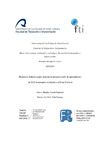Please use this identifier to cite or link to this item:
https://accedacris.ulpgc.es/jspui/handle/10553/109367
| DC Field | Value | Language |
|---|---|---|
| dc.contributor.advisor | Vidal Luengo, Ana Ruth | - |
| dc.contributor.author | Daoudi Begdouri, Khadija | - |
| dc.date.accessioned | 2021-07-04T20:10:41Z | - |
| dc.date.available | 2021-07-04T20:10:41Z | - |
| dc.date.issued | 2021 | en_US |
| dc.identifier.other | Gestión académica | - |
| dc.identifier.uri | https://accedacris.ulpgc.es/handle/10553/109367 | - |
| dc.description.abstract | La comunidad migrante de origen marroquí es una de las más numerosas en España, concretamente, en Gran Canaria, y tiene unas necesidades de formación en EL2 específicas para su integración. Diversos estudios han detectado que, entre ellas, hay dificultades fonético-fonológicas, sobre todo, en aprendientes con un nivel inicial de competencia en español. Estos estudios indican también que hay posibles interferencias en el aprendizaje de español procedentes de su L1, que puede ser el árabe clásico y formal, pero también el árabe coloquial marroquí. Así pues, en este estudio analizaremos, en primer lugar, cuáles son las dificultades fonético-fonológicas de los aprendientes de EL2 marroquíes, en segundo lugar, las posibles interferencias del sistema fonológico del árabe coloquial marroquí en el aprendizaje de español y, por último, cómo se pueden resolver y trabajar estas dificultades en el aula de EL2. Los objetivos que queremos conseguir son: indagar en las dificultades de pronunciación entre estos aprendientes, analizar las posibles interferencias del dialectal marroquí en el aprendizaje de la pronunciación de español y elaborar una propuesta didáctica que atienda a las necesidades detectadas. Nos basaremos en diversos estudios sobre las dificultades y los errores de aprendientes arabófonos y en particular, marroquíes. En cuanto a la metodología de este trabajo, se realizará un análisis contrastivo del sistema fonético y fonológico del español y del árabe, mostrando también las especificidades del dialecto marroquí. Haremos un estudio de caso donde participarán ocho sujetos marroquíes residentes en Gran Canaria que, tras contestar a una serie de preguntas, leerán un texto y los grabaremos en formato audio. Mediante esta producción oral, podremos detectar cuáles son las dificultades más recurrentes y proponer un material didáctico que pueda ayudarles a mejor su pronunciación. | en_US |
| dc.description.abstract | The Moroccan migrant community is one of the biggest in Spain, specifically in Gran Canaria and that population has specific training needs to learn Spanish as a second language (L2) for its integration. Different studies have detected that they have phonetic and phonological difficulties, especially those learners with a basic level in Spanish. Moreover, these studies suggest that their mother language (formal Arabic and colloquial Moroccan Arabic) may also make interferences in the learning. Therefore, in this study, we will firstly analyse which are the phonetic and phonological difficulties that Moroccan learners of Spanish as L2, find. Secondly, we will investigate which are the possible interferences of the phonological system of colloquial Moroccan Arabic in learning Spanish. And, finally, we will check how these difficulties can be solved and worked on in class. The objectives we want to achieve are: to investigate the pronunciation difficulties of these learners, to analyse the possible interferences of the Moroccan dialect in the learning of Spanish pronunciation and to elaborate a didactic proposal related to the needs detected. This investigation will be based on different studies about the difficulties and errors of Arabic-speaking learners, particularly Moroccans. The methodology we will use in this work will be based on a contrastive analysis of the phonetic and phonological system of Spanish and Arabic, which will also show the specificities of the Moroccan dialect. We will carry out a case study with the participation of eight Moroccan persons that live in Gran Canaria. They will answer some specific questions, they will read a text and we will record them in audio format. Through this oral production, we will be able to detect which are the most recurrent difficulties and we will propose didactic material in order to help them to improve their pronunciation. | en_US |
| dc.language | spa | en_US |
| dc.subject | 570111 Enseñanza de lenguas | en_US |
| dc.subject | 570505 Fonética | en_US |
| dc.title | Propuesta didáctica para mejorar la pronunciación de aprendientes de EL2 marroquíes residentes en Gran Canaria | en_US |
| dc.type | info:eu-repo/semantics/masterThesis | en_US |
| dc.type | MasterThesis | en_US |
| dc.contributor.departamento | Departamento de Filología Hispánica Clásica y de Estudios Árabes y Orientales | en_US |
| dc.contributor.facultad | Facultad de Traducción e Interpretación | en_US |
| dc.investigacion | Artes y Humanidades | en_US |
| dc.type2 | Trabajo final de máster | en_US |
| dc.utils.revision | Sí | en_US |
| dc.identifier.matricula | TFT-63510 | es |
| dc.identifier.ulpgc | Sí | en_US |
| dc.contributor.buulpgc | BU-HUM | en_US |
| dc.contributor.titulacion | Máster Universitario en Español y su Cultura: Desarrollos Profesionales y Empresariales | es |
| item.grantfulltext | open | - |
| item.fulltext | Con texto completo | - |
| crisitem.advisor.dept | GIR IATEXT: División de Estudios de Corpus y Lingüística Aplicada | - |
| crisitem.advisor.dept | IU de Análisis y Aplicaciones Textuales | - |
| crisitem.advisor.dept | Departamento de Filología Hispánica, Clásica y de Estudios Árabes y Orientales | - |
| Appears in Collections: | Trabajo final de máster | |
Page view(s)
81
checked on Jan 11, 2026
Download(s)
32
checked on Jan 11, 2026
Google ScholarTM
Check
Share
Export metadata
Items in accedaCRIS are protected by copyright, with all rights reserved, unless otherwise indicated.
